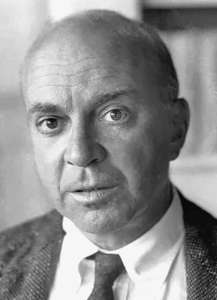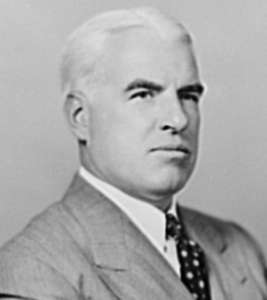REVIEW POTPOURRI – Novelist: John Dos Passos
 by Peter Cates
by Peter Cates
John Dos Passos
Novelist John Dos Passos (1896-1970) was most famed for U.S.A., a trilogy of 3 novels- The 42nd Parallel, 1919 and The Big Money– all of which were published between 1930 and 1936, years of the “Great” Depression and the resulting misery and turbulence .
Dos Passos was a very committed progressive until the mid-30s Spanish Civil War between General Franco’s fascists and the Loyalists who wanted a socialist government. When the Soviet Union sent soldiers and supplies to help the Loyalists against Franco who had the support of Hitler and Mussolini, Stalin’s agents were murdering fellow Loyalists, including a close friend of Dos Passos.
The author became disillusioned with progressivism and became a staunch conservative who was later a loyal supporter of Barry Goldwater and Richard Nixon.
From the beginning, his novels mixed fiction with historical vignettes and were written in an impressionistic manner where the rules of English grammar and sentence structure were often disregarded. Also, he would show a certain bias in depicting the struggles of social justice versus the selfish rich.
A 1961 novel Midcentury has a similar narrative pattern but the bias has changed to a more conservative one as seen in the following passage in which the labor unions have their own thugs and workers are getting very little for their membership dollars while Union leaders own Cadillacs (as in Jimmy Hoffa and the Teamsters) :
“Denial of the working man’s most elementary rights, the underworld’s encroachment on the world of daily bread, slugging, shootings, embezzlement, thievery, gangups between employers and business agents, the shakedown, the syndicate, oppression, sabotage, terror.
” ‘Instead of serving the members of the unions, you are serving a national dictatorship, ‘ Senator McClellan told a restaurant workers’ organizer. ‘Captive members have no control, no authority, no contract, no entry to the union’s affairs. They are virtually captives. They have to do what they are told if they want to work.’ ”
For what it’s worth, Dos Passos’s technique of writing remains an inspiration to novelists whose world views are radically different from his, quite the tribute to his style and originality.
Edward Stettinius
FDR’s Secretary of State Edward Stettinius (1900-1949) accompanied Roosevelt to Yalta in February , 1945, for meetings with Churchill and Stalin. In 1946, he had personality conflicts with Truman and resigned.
In a book of memoirs on the Yalta Conference, Roosevelt and the Russians, which was published in 1950, a year after Stettinius died suddenly from a heart attack, he describes Stalin’s equally evil Security Chief Beria (1899-1953):
“I had been informed that he was one of the strong men in the Politburo, and he impressed me that evening as being hard, forceful, and extremely alert.”
Edith Mathis
A 1966 LP (Seraphim 60015) features soprano Edith Mathis, still living at 85, singing nine very beautiful German songs by George Frederick Handel (1685-1759) who is best known for his oratorio Messiah. She is accompanied by a very accomplished group of musicians on the recorder, flute, oboe, bassoon, violin, viol da gamba and harpsichord.
Victor Herbert
RCA Victor’s 1960 album, The Music of Victor Herbert (1856-1924) presents a dozen of his operetta songs which were rightfully popular more than 100 years ago and are still heard from time to time. They include March of the Toys from Babes in Toyland, Ah Sweet Mystery of Life which was a megahit 78 for Jeannette MacDonald and Nelson Eddy and In Old New York.
British arranger George Melachrino and his orchestra gave performances which conveyed the music’s melodic simplicity without the syrup so often heard on way too many occasions.
Herbert was also a cellist and Music Director of the Pittsburgh Symphony.
Scandal
I recently started bingeing on Scandal, starring Kerry Washington, Katie Lowes, Darby Stanchfield, Guillermo Diaz, Tony Goldwyn and others who give fine performances in a series that depicts a crisis management law firm in the nation’s capital. Beginning in 2012, the show ran for seven seasons . Thus far, season one’s first four episodes have left me eager for more.
The 1934 black and white Anne of Green Gables had fine performances from 16-year-old Dawn Evelyn Paris (1918-1993) who later took the name of Anne Shirley as her own after portraying the main character; Helen Westley as Anne’s gruff but good-hearted guardian Merilla; O.P. Heggie as Merilla’s kindly brother Matthew; and Sara Hadon as a nosy neighbor, the typecast kind of personality she was quite gifted at during Hollywood’s golden years.
Responsible journalism is hard work!
It is also expensive!
If you enjoy reading The Town Line and the good news we bring you each week, would you consider a donation to help us continue the work we’re doing?
The Town Line is a 501(c)(3) nonprofit private foundation, and all donations are tax deductible under the Internal Revenue Service code.
To help, please visit our online donation page or mail a check payable to The Town Line, PO Box 89, South China, ME 04358. Your contribution is appreciated!




Leave a Reply
Want to join the discussion?Feel free to contribute!